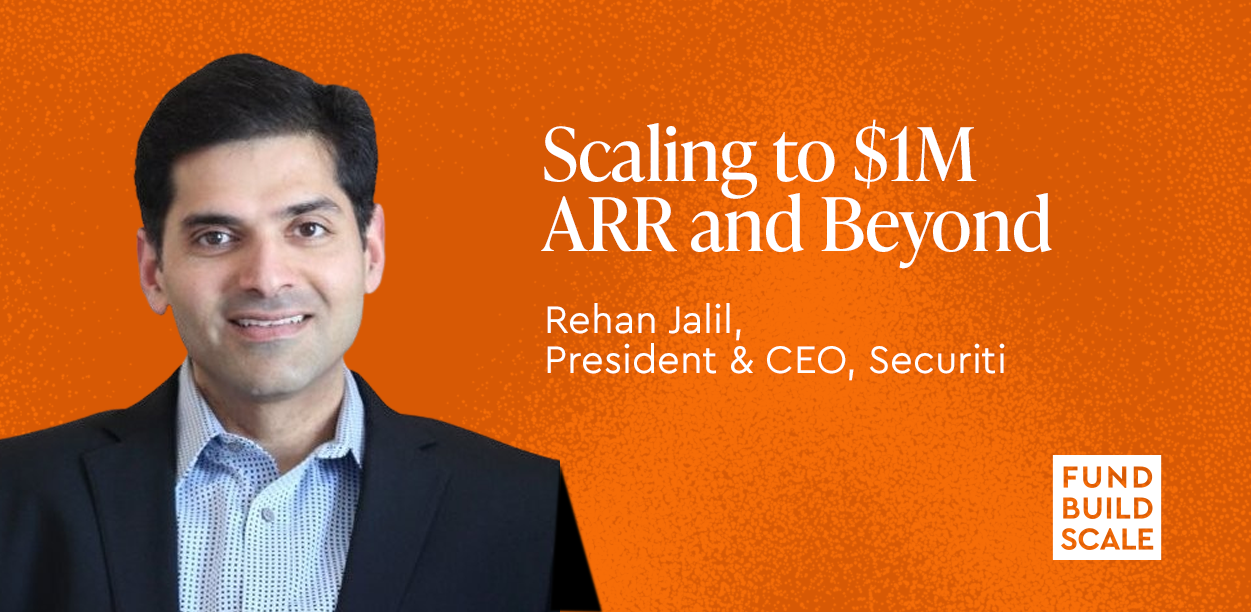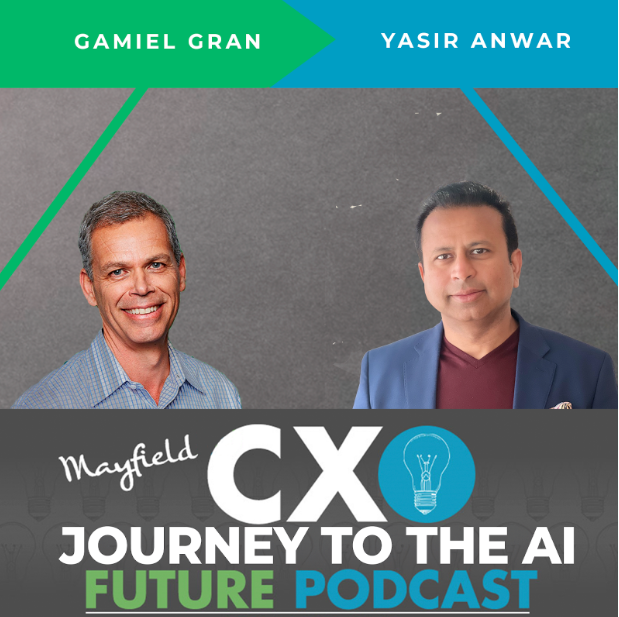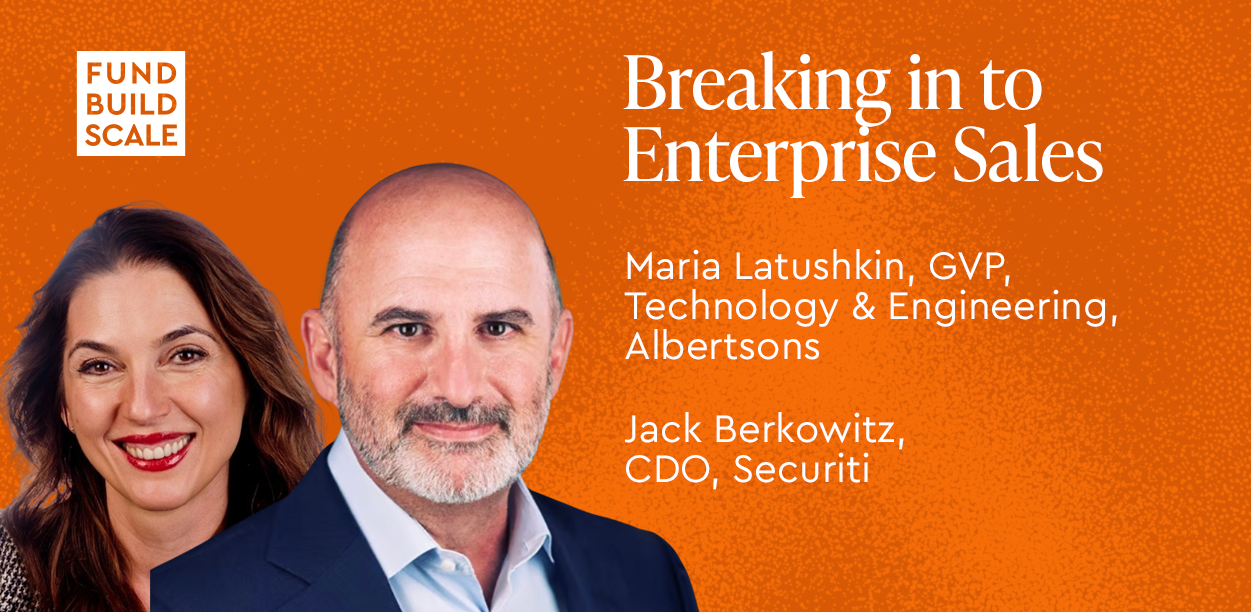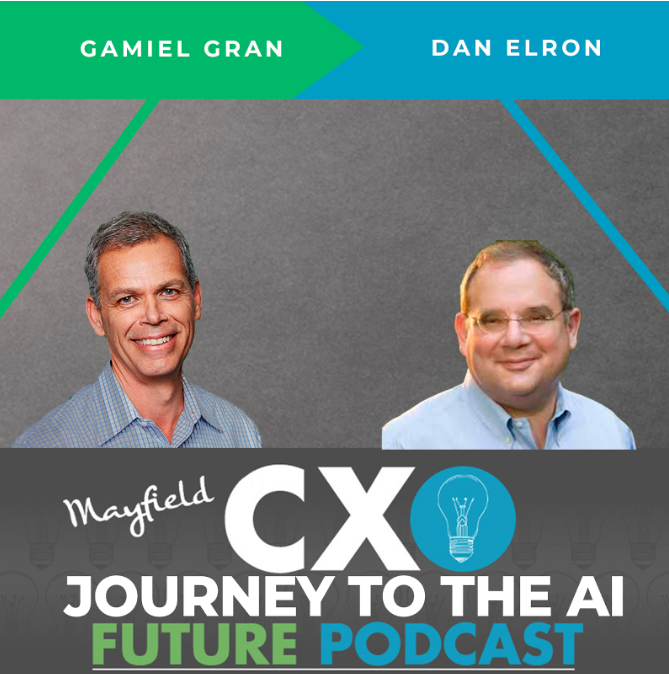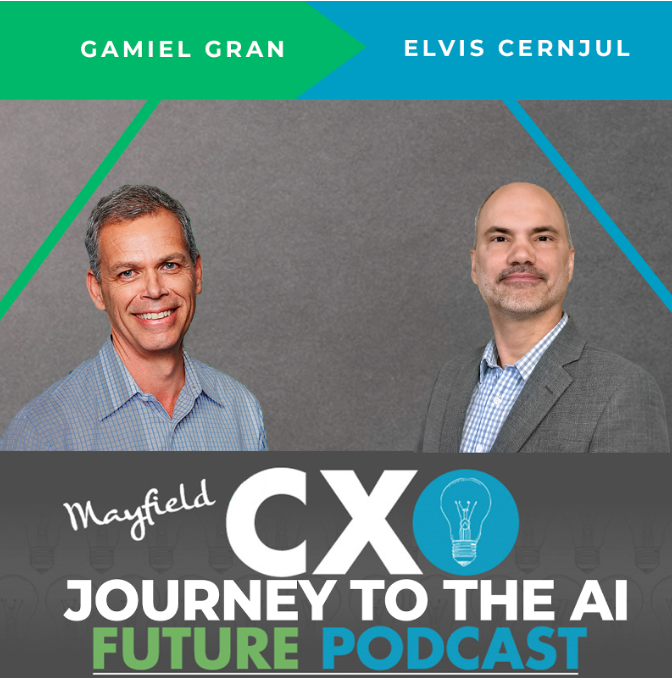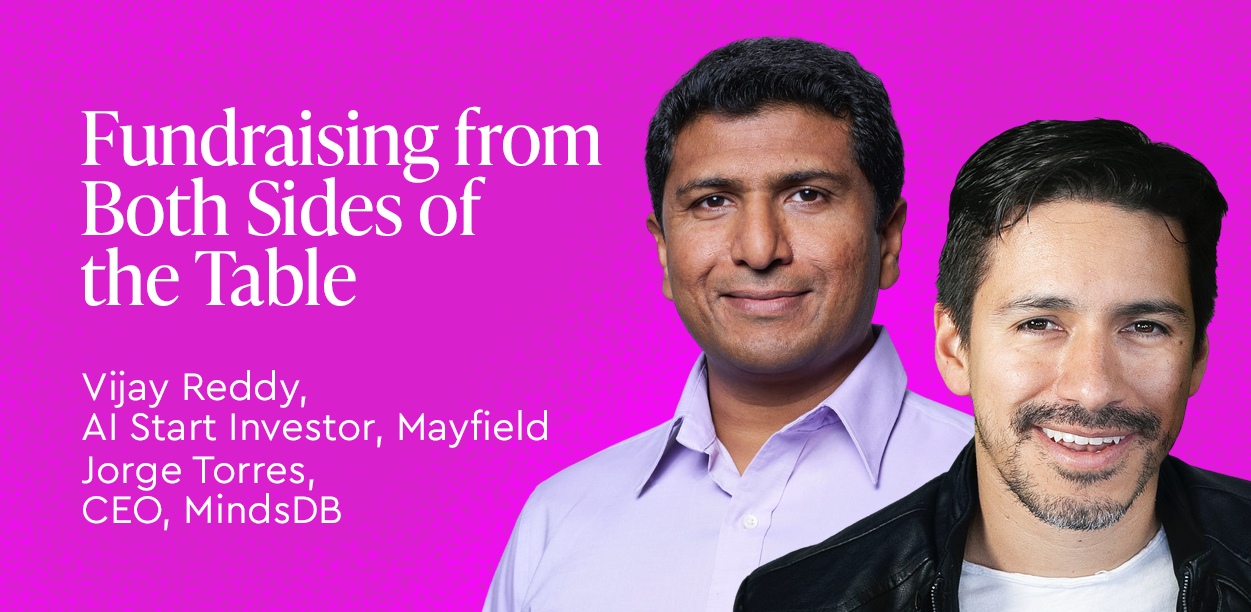Listen to the Podcast:
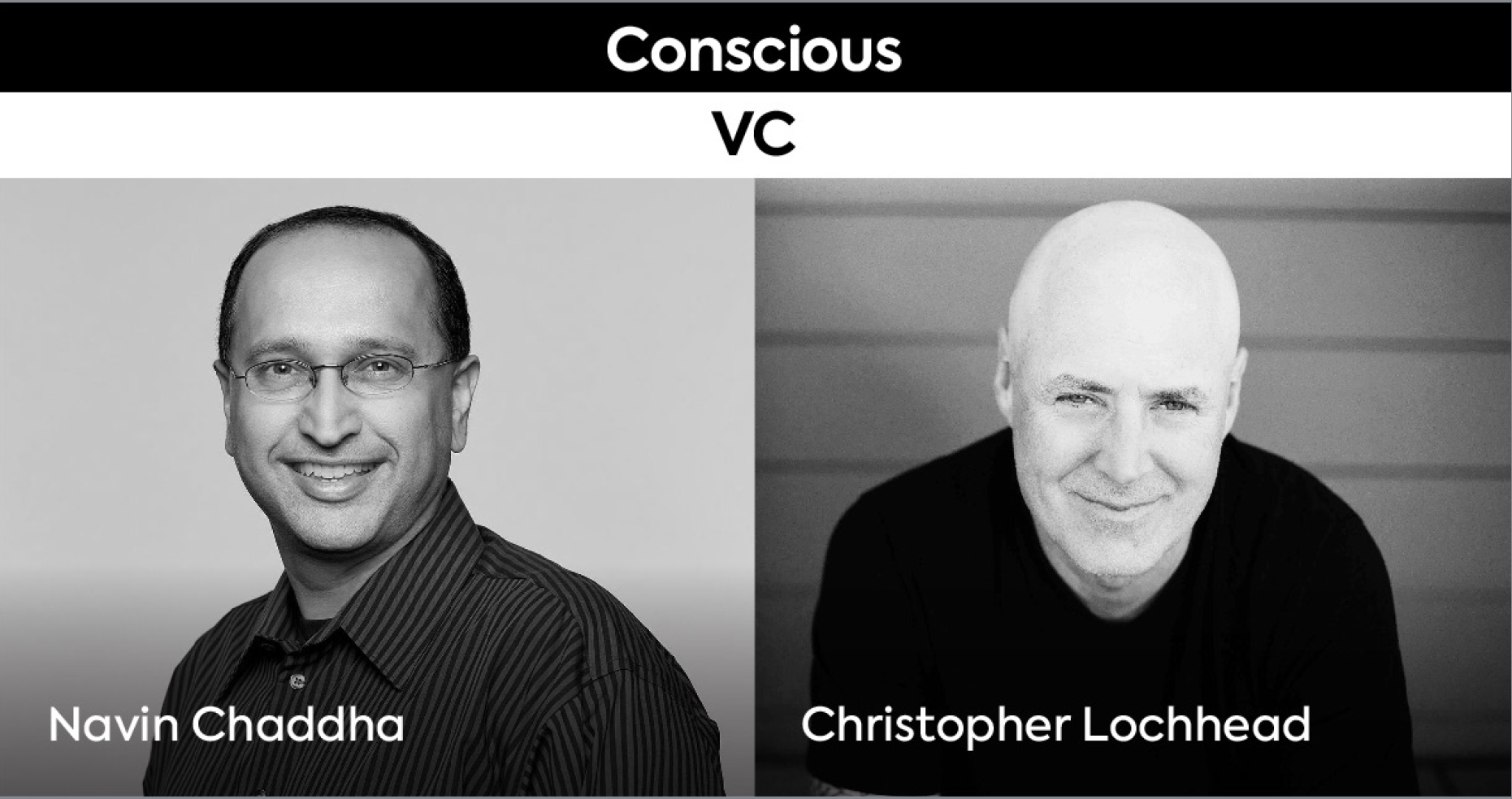
To support human and planetary evolution, we need to adapt as a venture capital industry to become conscious capitalists, building business for better rather than for business as usual. In this episode Navin lays out the pillars of conscious capital and why we at Mayfield believe that it’s time for VCs to lead with empathy and think beyond returns.
The Five Pillars of Conscious Capital
Welcome to Conscious VC, where we have real conversations that explore how to build businesses that shape the future while making a giant difference at the same time. Hosted by Navin Chaddha, Managing Partner of Mayfield, and me, podcaster and author, Christopher Lochhead. On this episode, Navin and I wanted to share with you what the vision is behind this show and why we think that expanding the dialogue around conscious capital is critical for entrepreneurs, venture capitalists, and candidly, anyone who cares about building the companies and the categories of the future. Enjoy.
Navin, it’s wonderful to be with you. It’s a great opportunity to talk about an incredibly important topic now in conscious capital. How are you?
I’m doing well. I appreciate you having me back. It’s a real pleasure to be with you.
I can’t wait to do this podcast series together. One of the things I was thinking about off the top of my head, particularly after our last conversation, is this topic of what’s the role of business beyond just “making money?” I’d be curious what your thoughts are on that.
Let me start with why it’s important to be conscious capitalists and they’re businesses for better, rather than for business as usual. As both of you and I know, twenty years into the new millennium, we are finding ourselves in tough times. COVID-19 has locked the world at home. Racism has lit out streets on fire. Millions of Americans are unemployed and many will not have a job to return to. Compassionate leadership is absent. Social media is creating confusion rather than clarity. At the same time, climate change continues unabated, wreaking silent havoc on our marine and forest ecosystems, as seen with recent fires in California. It seems progress is inevitable, but I’m an eternal optimist and I believe it is not. Progress is going to happen. It’s the outsiders, the dreamers, and the visionaries that will create progress. We must support them now more than ever. My feeling on your question on business for better, rather than business as usual, it’s extremely important that we not just look at profits, but look at how we can be empathic to others and think beyond riddance. That’s the critical thing we need to keep in mind.
I find this fascinating. I’m somebody who has spent my entire adult life in the technology industry and the startup ecosystem here in the Silicon Valley area. Many years ago here, many VCs are talking about things beyond profits or certainly empathy. These were not topics and phrases we heard very much. Where is this change coming from?
I think the reason it’s becoming extremely important is people are realizing we need to look at the social impact of technology, not just technology. At the same time, we need to create opportunities for diversity, equity, and inclusion. We need to bring an ethical lens to leadership. I’m a firm believer of we need to invest in relationships, not transactions. If you’re going to essentially focus on human and planetary evolution, that’s what is going to get needed to get to the next stage.
It is interesting that many of our business leaders and now leaders in Silicon Valley, some of them are waking up and maybe others are taking more seriously the role of venture capital, the role of entrepreneurship, the role of business beyond earnings per share. How do you think about making trade-offs? If I’m a founder or a CEO in my mind between doing things to drive my bottom line versus doing things that might make an impact in my community or in the environment, or in other areas where I want to do some good, how do I deal with this trade-off in my mind?
That’s an interesting question. I can talk about my perspective on it and what I’m doing as the leader of Mayfield. I look at having five pillars of conscious capital. The first one being operating as conscious leaders, who combine empathy and radical candor. The second being investing in the rise of the individual. The mission has to be to elevate individuals by empowering them and giving them a voice. The third is to reinvent trillion-dollar industries to power human and planetary health. The fourth is leading the movement to rehumanize social media. Finally and most importantly, God willing if you have the means, let significant funds towards philanthropy, but at a minimum, do meaningful work pro bono to address diversity, education, hunger and health. Those are the five things I think are important as a package. For us as business leaders, whether venture capitalists and entrepreneurs, we should be thinking about and not just thinking about the ROI, which is the Return on Investment. I look at ROI as the Rise of the Individual.
It’s interesting because sometimes the spoken can speak as loudly or in some ways more loudly than the unspoken. One of the things I hear you say as you go through the five pillars is we’re now at a place where we can no longer build businesses with a singular lens around growth and earnings. The lens must be expanded.
It has to be expanded. If you notice what has happened in the world, companies which are focused on corporate governance impact on environment and society, if you look at how they are being viewed by their shareholders in a different light and the kinds of multiples they’re getting, is showing that in a positive way. If you don’t do this, it will not happen to you. You need to think beyond, as you and I are talking about just tactical stuff and saying like, “My earnings are important,” but you need to look at what all you can do with that money to improve human and planetary evolution.
The other thing I find interesting in all of this is, of course, I have the benefit of knowing some of your experience and your life story, and you and I share many things. Your experience as an entrepreneur, it strikes me that you like me, entrepreneurship was not just a way up, but really it was a way out. I think it is for many entrepreneurs. I’m curious how much your own personal journey from India ultimately to Silicon Valley, becoming an entrepreneur, becoming an investor and venture capitalist, how much your own personal experience is informing your desire, and ultimately Mayfield’s desire to take these broader five pillars approach?
I think the experience I’ve had has been instrumental in defining what I’m trying to do and why it’s so important to me personally. I came in as a student in 1992 to Stanford on a fellowship that was involved by somebody I didn’t know. It was never disclosed to me. I didn’t have the means to come and study in the United States at a prestigious school like Stanford. I came in with a few hundred dollars in my pocket, but my education, boarding, meals, everything was taken care of. After I got my fellowship, I joined the Ph.D. program as a research assistant. The money I was getting from the research branch, whether it was DOD or government, ended up paying for my Ph.D. work. When I started my first company, VXtreme in 1996, which became the foundation of Windows Media eighteen months later, people bet on me. I didn’t have any work experience. I had ideas. I had a vision.
If I look back following ten years from ‘96, I did three companies. I was very fortunate to have success in all three. I realized it’s time to give back. Initially, as a venture capitalist, I have helped support over 50 entrepreneurs that I’ve invested in as a lead. Under my leadership, Mayfield has invested in over 150 companies. I’ve been very fortunate to be on the board of companies where we have helped entrepreneurs, where 17 of them have had IPOs and another 18 have been acquired. Then a few years back, I realize now that business is going well and we are seeing the financial impact by our entrepreneurs and they’re making money for our investors, “What else can we do?”
I love that question, “What else can we do?” It’s a great question.
My belief is it’s not just about the money. Every little thing you do is like dropping a drop in a bucket. Before you realize, a lot of people start doing it, it fills the bucket. The bucket can go and it starts filling up many buckets. There is a network effect of impact that can be created. To me, somebody has to ignite the spark and it starts a movement. There is no end to it. My hope is with the work Mayfield is doing and what I’m trying to do, it’s not going to be proprietary. It’s going to allow an open ecosystem for many other venture capitalists and entrepreneurs to collaborate with us, and build businesses for better and give back to society to make for a better place to live.
One of the things I love about your story, and it made me think about my own life in this context is were it not for the kindness of strangers and the contributions of strangers, both monetarily and otherwise, your life would be almost impossible to have created.
Somebody has helped you. God gave you human life. Your parents were critical in getting you into this world. When you went to school, somebody taught you what to do. Then you’ve gone into business, you had wonderful advisors and board members and investors. It’s a journey. Every day in my job, I’m learning through people like you. I’m learning from the entrepreneurs, trying to contribute to them. Every day is a new day where you’re learning something. In turn, trying to give back what you’ve learned from your experiences and the means you have in any which way, whether intellectual or financial.
Why do you think it’s important for the Silicon Valley startup ecosystem to begin embracing these five pillars and the idea of being a conscious capitalist at a level like we haven’t before?
The way I look at it, as I mentioned at the beginning of our conversation, look at what’s happening with climate change. It’s creating havoc on marine and forest ecosystems. It’s impacting humans. Look at the COVID-19 situation. You look at the systemic racism that has happened in this country. If you think about profits and don’t look at the macro picture, it’s going to hurt us. It’s going to hurt our livelihood. It’s going to hurt the livelihood of society. In the end, even if you are a business, which is focused on for profit, you need the ecosystem to thrive. You need your customers to thrive, you need your partners to thrive. You need your suppliers to thrive, you need your employees to thrive. Your aim has to be, how do you help others work at the peak of Maslow’s Hierarchy? What things can you do? If you can do that, you’re going to come out as winners. That’s what we are seeing with all the ESG efforts that are happening in the world. It’s becoming a better place.
The other interesting thing about this mindset is there are some people whose mindset is, “If you’re successful, then I’m not. If you have something, then I have less of something,” as though we were a bunch of monkeys fighting over the same barrel of bananas. When in point of fact, I believe that we’re living at a time, particularly in the technology industry but we see it elsewhere, where legendary entrepreneurs create new things that drive new value. You talked about the network effect and the ecosystem. It seems to me that this economic paradigm where we’re fighting over a scarce resource is an old mindset. When in point of fact today, legendary entrepreneurs through creating massive amounts of new value, create new avenues of wealth, new avenues of growth, new avenues of human innovation and creation and contribution. This mindset of, “If you win, I lose,” seems to be an old mindset that I hope you’ll tell me is dissipating in Silicon Valley.
I would say it’s beginning to, but if I look at over the next ten years, I think we have to all make a conscious effort on how we create a win-win for everybody. In a rising tide, all boats should rise. You shouldn’t essentially grow at the expense of others. When we run for-profit businesses, we have to compete with each other. There has to be a healthy balance of how do you grow together? How do you have a common set of values and mission as businesses? One of the things I’m a strong believer in is all of us are better than anyone of us individually. If businesses and entrepreneurs and venture capitalists team up, hopefully, one plus one is not two, it’s 5 or 10 or 11. It’s the power of a network that can end up creating extreme value for the whole ecosystem.
We’re going to have a guest, Manish Chandra, in one of our podcast series, who is the founder or CEO of Poshmark, the leading social commerce marketplace, which is empowering a sale to happen every second. One in five people is out in America and they’re fostering millions of sellers to open online stores on Poshmark and make a living. I’m pretty sure he’s going to share many stories of how rather than raking a lot of profit by itself, how people are paying for the education, how they’re able to buy a car, how they’re able to pay for their kids. How are they able to take care of members in their family who are not healthy? At the same time, we have companies and entrepreneurs, which are focused on planetary health. They’re focused on human health. They’re doing things. Lyft is a prime example of a company that has pledged that they’ll give their 1% of their profits for local communities. At the same time, when bad incidents have happened like Lyft is the first one to step in, who has given free rides to its customers and has delivered medicines. I think that’s an example. If you do that, the customer loves you. The customer becomes your sales agent. The customer goes and gets you, other customers. That’s how the network, the love ends up spreading.
It is a powerful insight, and I think an important one, this notion of part of the way we build successful businesses today is through radical generosity. You mentioned that we have to compete. Lyft competes with Uber. We do have competition in that sense, but if you look at it, if you look at the mega technology breakthroughs and scientific breakthroughs, whether it’s mapping the genome, the creation of the internet itself, mobile technology, the continuing wonderful innovation explosion that has come with the cloud, these things build opportunities for all sorts of different niches and applications and areas to come out. The interesting thing is if we look at the value that’s been created by way of example, just from the early days of the internet, where there are many category niches where there were battles fought between competitors, but the creation of the internet, then mobile computing, then the cloud, in aggregate has created a massive amount of opportunity and a massive amount of abundance. That’s been one of the biggest things on my mind since the last time you and I spoke is that if you take this conscious capital mindset, you’re creating a much bigger ecosystem of value. That’s a different way of thinking than, “How do I fight for more than my fair share of the bananas, so to speak?”
One of the practice or means to see entrepreneurs, re-humanizing social media versus deploying it as a divisive force. We have seen this over the last many years, there has been something missing in all the social media stuff. What’s been missing is humanity, intimacy, reality, that connection. What is needed is an expression and representation of values, nuance, balance, a real conversation. I believe the next generation of social media entrepreneurs, they’ll create a return to authenticity and trust instead of clicks, likes, fake news, and votes. These companies which do it could create the next Facebook. They could create the next Twitter. They could create the next Instagram. All of us are fed up with what happens in social media. There is a way for a no-advertising option, which would be available.
There could be things in which you make humanity, the world a better place. Unless we dream of such things, they will never happen. We have to look out for the dreamers. We have to embrace the unconventional, the different, and the unusual. What I’ve seen in my career in Silicon Valley since the mid-‘90s as an entrepreneur and a VC, it’s often the founders who don’t come out of central casting that have the great necessary to succeed. Against seemingly insurmountable odds are the ones which ended up creating iconic companies. Our job is to make a bet on them as VCs, have thought that great people will evolve, be loyal to a fault, and believe in teamwork, that all of us are better than any of us. Everything you do, invest in long-term relationships, and support entrepreneurs through all the ups and downs of a startup. If we do this and entrepreneurs do it to their employees and do it to their customers, do it to their partners, do it to their suppliers, people are going to be better. Not only will we achieve our for-profit goals, but we’ll end up making the world a better place to live. All of us will thrive and the planet will be better. There’ll be fewer fires, racism, and economic disparity. You have to have an agenda that drives diversity and inclusion.
I must ask you as we get ready to wrap, you mentioned the word ‘dream’ multiple times, and of course, I love that phrase, dream, and dreamers. What’s your dream of doing this podcast? What was the motivation for wanting to do this?
It’s driven by how do we inform others who are more capable than us about this concept and how do we say, “Please join forces, let’s make the world a better place?” How do we empower others? How do we back on the rise of the individual and give voice to them and create a situation where it’s a win-win for everyone? The purpose of this podcast with your help is can we spark a movement? We are going to bring in some spectacular people to the podcast series. I wanted to mention, not only as Manish agreed as the CEO of Poshmark to be here, Sal Khan, Founder of Khan Academy, who is a conscious leader in education. Then Kim Scott, author of Radical Candor with the forthcoming book, Just Work, will be with us. Those are our first three speakers. We’re going to be adding more. The aim or the bar I have with you, Christopher, is how do we ignite a moment around conscious capitalism? That’s the reason. I’m doing it to get many more people along with us to partner and change the world and make it a better place to work, live, and play.
I love that that’s your motivation. I love that you’re willing to put your heart on your sleeve like that. I’m very honored to be partnering with you. I’m very much looking forward to our conversations with our guests. Hopefully, we’ll initiate a conversation with some of our audience. Anything else?
I’m looking forward to taking this mission forward and having not only entrepreneurs but your audience and anybody who wants to contribute to these efforts and to give us ideas and to engage with us and to take this mission forward.
Thank you. Hopefully, you’ll be with us all soon on our next episode.
It’s a real pleasure to be doing this with you, Christopher.
The pleasure is all mine.
—
Thanks for joining us with Navin Chaddha, Managing Partner of Mayfield, and me, podcaster and author, Christopher Lochhead. You can find me on the internet at Lochhead.com. Conscious VC is presented by Mayfield. Visit Mayfield.com, where you can learn more about the five pillars of conscious capital and much more. Thanks again for reading.





